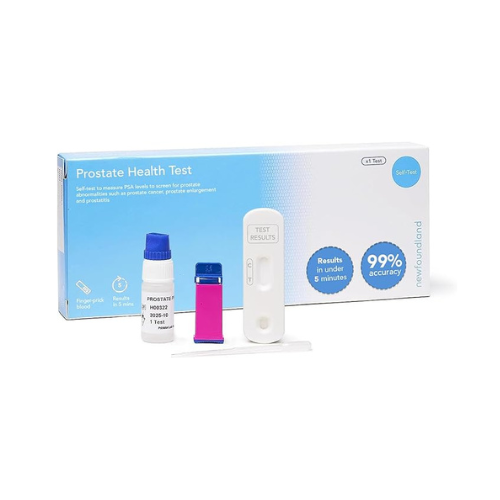
Newfoundland
Newfoundland - Prostate Health PSA Test Kit - Finger-Prick Test
Product Features
Estimated delivery is between Friday, 07 Nov and Sunday, 09 Nov if you order right now anywhere in UK
Description
The Newfoundland Prostate Health PSA Test Kit is an easy-to-use, at-home self-test designed to measure prostate-specific antigen (PSA) levels in your blood using a simple finger-prick sample. With results available in just 5 minutes and over 92% accuracy, this convenient screening tool helps you monitor your prostate health from the comfort of your home.
Elevated PSA levels may be an early indicator of prostate health issues, including prostate cancer, benign prostatic hyperplasia (BPH), or prostatitis. This test empowers men-especially those over 40 or with risk factors such as family history, high stress levels, or lifestyle challenges-to take proactive steps in tracking their prostate health and seeking timely medical advice if needed.
The kit includes a test cassette, buffer solution, lancets, alcohol wipe, capillary dropper, and clear instructions for safe and effective home testing. This simple, chemical-based test detects the PSA protein produced by the prostate gland, providing a quick assessment of whether your PSA levels are within the normal range.
Who is this test for?
Younger men are increasingly being diagnosed with prostate health issues attributed to poor dietary habits, high stress levels, exposure to pollutants and toxins, higher rates of obesity in addition to frequent sexual activity and infections. Individuals at risk of developing prostate health issues include.
 Prostate Cancer
Prostate Cancer
Men over 50, African-American men, and those with a family history due to genetic and demographic factors.
 Prostatitis
Prostatitis
Younger men, particularly those between 30-50, due to infections or inflammation affecting the prostate.
 Benign Prostatic Hyperplasia (BPH)
Benign Prostatic Hyperplasia (BPH)
Men over 40, especially those with a family history, as the prostate tends to grow with age.
Disclaimer: This product is a general wellness item. It is not intended to diagnose, treat, cure, or prevent any disease. Always consult a qualified healthcare professional if you are pregnant, breastfeeding, taking medication, or under medical supervision. Food supplements should not be used as a substitute for a varied diet and healthy lifestyle.



